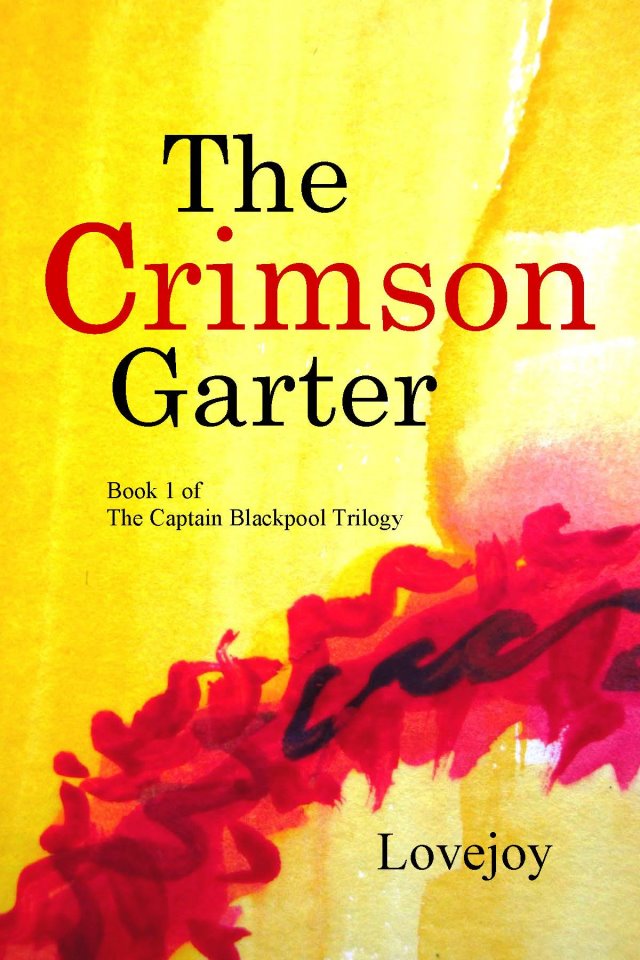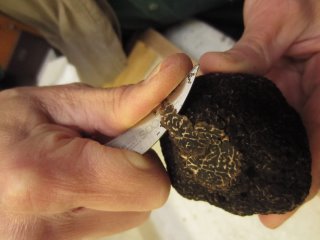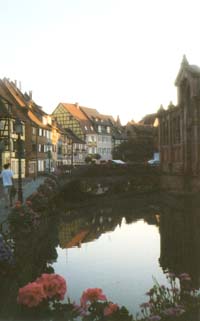
Sir Robert Marsh has resolved to head to Paris to locate Grazia. Capt Harry Blackpool, meanwhile, has ventured to Prague, as chapter 16 of The Crimson Garter opens in Karlstejn Square. Lucire travel editor Stanley Moss, writing pseudonymously as Lovejoy, continues his story
Chapter 16
An air of pageantry enveloped Karlstejn Square, and a blazing sun shone on the assembled crowds, heightening the intensity of colourful costumes worn, banners displayed and the rosy tiles of the rooftops, all brilliant in the morning light. Prague’s delighted citizenry had turned out in the thousands for the procession in honour of the Dragobek family. They understood that rampant celebration was the order of the day. Taverns opened their doors early, alms had been distributed to the poor, flags waved, and a general feeling of excitement enveloped the city. The gilded spires surrounding the square shimmered golden in the sun’s rays, and wafting scents of marvellous meats and pastries cooked over open fires drifted across the crowd. Since dawn a carnival atmosphere had prevailed, while the square filled with eager onlookers jockeying for advantageous positions along the procession’s route. When the noon hour finally arrived all assembled were anxious for the appearance of the nobles, and they would not be disappointed. An excited roar rose up as the line of carriages, first sighted across the river, began to cross the wide bridge, then headed for the cathedral. When the first carriage entered the square a deafening cheer greeted the nobility, who waved magnanimously in acknowledgement, as they were obliged. According to custom, children—who had been given bunches of fragrant blossoms—began to gleefully toss the flowers, and in no time the carriages were blanketed with bursts of colour.
First came the Archbishop, followed by an endless procession of monks and nuns, filing along solemnly behind. Next an entire regiment of soldiers had been mustered, the first group on horseback, the second marching in tight columns, and lastly the most impressive group of equestrians armed to the teeth, staring impassively forward, preceding the royal coach from which the prince, overweight and pasty-faced, waved disinterestedly. His thoughts were clearly elsewhere, and his eyes nervously scanned the rooftops, where the occasional military helmet could be glimpsed, indicating the post of a marksman. Immediately after came the nobles, beginning with the Lord Mayor of Prague, then a line of carriages, each bearing the seal of the royal house, the occupants people of no merit other than their hereditary titles, those who might, in less polite company, have been called the hangers-on of court. Today they were met by unenthusiastic applause and an aggressive barrage of flowers, which gave them the inflated sense that they truly mattered, that their worth was more than as players in an elaborate costume drama. The last of the coaches represented the private sector, inherited wealth and prominent business people who had risen according to their own merit or mercilessness, and these were the conveyances which interested Captain Harry Blackpool the most.
Earlier that morning he had located a small bookseller on an anonymous side street, where he had searched the musty shelves for the volume he required: a listing of the historic crests of Prague. And now, armed with the knowledge, he inventoried each carriage as it passed, waiting for the motif he sought. It struck Blackpool that nobility were interchangeable, that fashion seemed to travel faster than the people who promoted it, that he had seen the identical embellishments on fine ladies and gentlemen from London to Paris to Prague, and that it was all transitory and temporary, like every petty foolishness of this life. It was as if some divine hand had lifted the same faces from the Baron Schluysen-von Holstein’s ball and dropped them into the carriages which paraded past him now in Karlstejn Square, the same envious eyes, the same rosy complexions, the same overfed bodies, the same manicured hands. And yet, for all the horror and vulgarity he observed, Captain Blackpool sensed a kind of startling beauty, the way the light played on the polished swords, the flutter of sheer gauzes taunted by the breeze, the delicacy of a gloved hand’s wave. Overcome by his momentary reverie he nearly missed the opal blue carriage, which hesitated briefly in front of him and clearly bore the crest of the house of Kozlowski on its lacquered door. He quickly surveyed the occupants, first allowing his critical gaze to fall on the Countess Kozlowski, younger than he imagined, but more severe than he expected. She sat, obviously agitated, attempting to control a small dog in a bejewelled collar imprisoned on her lap. The mongrel could not be contained, and yip-yapped in all directions, snarling and growling at the crowds, first to one side, then the other, struggling to her great agitation. Even that infinitesimal drama struck Captain Blackpool as somehow beautiful in its own way. Next he turned his attention to the other passenger in the open carriage, and for an instant he doubted his own senses. He had hoped to identify the other passenger in the coach as Count Kozlowski, but instead he was absolutely certain that the richly dressed man who sat facing the Countess was none other than the Earl of Pinckney, the English fop hired by Robert Marsh, who had foisted himself on everyone in Paris, and from whom he had easily purloined the letter written by Balthazar to Grazia Rosetti, the same letter which now rested in a secret pocket in Captain Blackpool’s cape. He had dismissed the Earl of Pinckney as an irrelevant player in Paris, regarding him as a welcome distraction from the detection of his own activities there, and he had expected to see no more of the man—certainly not in Prague. Inexplicably the Earl had now ingratiated himself with the Countess Kozlowski, an unforeseen circumstance requiring his immediate attention. How was it possible that the Earl of Pinckney had beaten him at his own game? Was there some leak of information or had he simply blundered into the right place before Blackpool’s own inquiries could begin?
The carriage lurched forward, and continued its slow transit around the perimeter of the square, and Harry Blackpool elbowed his way through the crowd, following it, closely observing the conduct of the occupants. Nothing appeared to be wrong. The dog continued to bark, the Earl continued to make small talk, delighted at the splendour of the day, pointing in all directions at trivialities which struck his attention, the Countess glared darkly around her, watchful for any critical eye or rival. Nothing suggested a universe in upheaval. But Captain Blackpool knew that it was at moments like these when Krishna or Narnda Muni chose to play their tricks. It is all too perfect, he thought.
A beggar reached up his palm and Blackpool read the sincerity in the man’s eyes; he handed him a few coins, and kept after the coach. A pick-pocket observed this act and followed Captain Blackpool as he went, but when the petty thief tried for his purse Blackpool deftly broke the man’s thumb, the man buckled to the ground moaning in pain, and Blackpool went on ahead of his quarry, his eyes never leaving the carriage. Eventually he found himself on the steps of the cathedral, behind a line of soldiers who flanked the ornate doors, exactly at the moment the carriage bearing the prince came to a halt. The prince unsteadily exited onto a purple carpet, which had been rolled down the cathedral steps.
Suddenly a scuffle occurred at the edge of the crowd across the steps, only a short distance from the prince, a loud shout, then a scream, and a figure in rags burst through the guards and rushed towards the prince, hurling an object from his hands, and the last thing that Harry Blackpool remembered was an enormous flash of red and the smell of gunpowder so familiar to him, a whining sound in his ears, and as dark clouds closed about him he fell into a spiral of unconsciousness.
The first thing that occurred to Harry Blackpool when he next opened his eyes was an incredible ringing in his ears. Yet the noise did not emanate from inside his head, but from the outside, and he realized that church bells tolled loudly close by. He attempted to prop himself up on the couch that he lay on, but dizziness overcame him, a strange aching at his temples prevented him from elevating any further, and he fell back on his elbows, surveying his surroundings.
‘Welcome back to the world of the survivors,’ said a voice close enough to speak softly, but hidden at first in the shadows not far away. A man’s voice, with a note of weariness and compassion, Blackpool decided. When he turned his head in the direction of the voice he saw a man in an artist’s smock and paint-splattered beret seated across from him. Young, with dark, intense eyes, and who seemed very gratified that his guest had returned to consciousness, who immediately offered him a drink of water from the jug at his side. Captain Blackpool took it gratefully in both hands and drank it all.
‘An incredibly heroic gesture on your part,’ began the man in the smock. ‘Rushing forward to try and help that soldier who had been so horribly maimed by the explosion. I wish I could tell you that he was not already lost to this world. But it would have done no good.’ Blackpool shook his head and frowned. ‘Do you remember nothing?’ the artist asked.
‘The last thing I remember,’ Blackpool answered, ‘was the sound of an explosion. After that, I fear, everything went dark. Can you tell me what happened, where I am, who you are?’
The man in the smock nodded earnestly. ‘I am Laszlo, Count Kozlowski, but you will do me the honour of forgetting my title and call me by my first name. You are in the city of Prague, do you remember that? Aha! That is good. Then you also remember the Karlstejn Square.’
‘The royal procession. I came to view it.’ Blackpool put his hands to his temples. ‘I recall I wanted to see the procession of the nobles. You said your name was Kozlowski?’
‘That is correct. I am Count Kozlowski.’
‘How did I come to be here?’
Kozlowski looked around the vaulted space which surrounded them. ‘It was I who caused you to be brought here. This is my atelier. I paint as a pastime.’
‘Then why are the canvases slashed?’ Captain Blackpool asked. ‘It would seem to me very odd, or are you a man of such strong artistic temperament?’
‘That is another story,’ Kozloswki said. ‘Did you have any information about why the explosion occurred?’
‘Unfortunately I had only arrived that very morning. So I have no idea of anything.’
Kozlowski’s face took on a dreamy expression. ‘There was a man who felt he had been wronged by the royal house of Dragobek. He had decided to exact a terrible revenge on the family. Because of a kindness I had done to him in years past he came to me and entrusted me with that information, and much as I tried to prevent the tragedy I could not reach the prince in time, and the only result was the carnage that followed. I went to the square. Hard as I tried I could do nothing, and I will always bear that knowledge, of my own failure. Of the lives that were lost which I could not prevent.’
‘There is no need to mourn them,’ Captain Blackpool said simply. ‘Their time had come, and they have since gone on. It was written that you would try to save them, and it was written that you could not. Now they have no suffering, now they have no pain. You do not have the power to bring them back. Does that not suggest it is appropriate you put it behind you and go on with your life?’
‘One has the sense you have seen much death,’ Kozlowski told him.
Blackpool chose not to answer. ‘And you caused me to be brought here,’ he finally said. ‘Why?’
‘I must have been standing next to you. At the time of the explosion it had been my intention to try to warn the prince one last time. He had rebuffed all my entreaties. But when the man with the bomb came forward it was too late. Even though you were struck by the force of the blast, you stood up and tried to help that soldier. I still wonder how, and why. It was a remarkable act. There was such incredible chaos surrounding us on all sides, and you were covered with blood, and so many people were rushing to attend to the prince …’
‘What happened to him?’
‘The prince is dead, and that is why the bells toll. But I dragged you from the mêlée. I hoped you had not been seriously injured, you were unconscious, and so I felt that it would be best if I got you away. I was quite impressed that you would act so unselfishly when people all around you were consumed with their own interests. You made a valiant attempt to help the wounded, unlike so many others. You do not remember fainting. I had you brought here, and I hope you will accept my hospitality until you feel you can go back about your business. Can you remember your own name, and what you did before you went to the Square?’
‘My name is Harry Blackpool, but I do not remember how I came to be here,’ he said, feigning amnesia. ‘I think I would like to sleep a bit longer, if that would be possible.’
‘By all means!’ Kozlowski agreed instantly. ‘I shall wake you in a few hours and then we will dine together. By the way, the strange knife you wear at the small of your back you will find there on the pedestal under your cloak. I removed it when I had you set down on the couch.’ In a matter of minutes Laszlo Kozlowski collected himself, thrown on a great coat, and stole away down the stairs. Captain Blackpool napped.
When next Blackpool awoke, he noted that the Count had not yet returned. A quiet calm had descended on the place, and for its rusticity and simplicity he felt a simple comfort. The bells outside had ceased, and a pale moonlight shone through the gabled windows. A cool breeze drifted through, bearing the clean, clear air of the night. A single candle flickered on a desktop. He found he was able to sit up more easily, and doing so he took stock of his surroundings. Slowly he rose, and walked carefully around noting the canvases on the easels, most of which had been irreparably damaged. He reattached the kukri knife, and examined his cloak, which had obviously been cleaned and brushed, although traces of blood remained. The letter was still neatly sewn into the lining. Nothing had been detected in the secret pockets, nothing had been removed. When he again stood before the desk he hesitated, but Harry Blackpool was true to his nature. First he found a small notebook, surprised to discover a number of sketches of himself, obviously asleep after the accident, studies of his own profile. They had been executed quickly with a few lines, but the likenesses were good. Captain Blackpool put the notebook back exactly where he had found it. He made a methodical search of the contents of the desk, feeling no pangs of conscience whatsoever. In a deep drawer on the right hand side, concealed under a volume of Italian reproductions he came upon a bound notebook. When he drew it out and began to leaf through it he found his heart beating, for he quickly discovered pages upon pages of sketches of La Fragolina, in performance, in costumes, in mythological settings, and finally a series of preparatory studies for the painting of The Crimson Garter. There was no doubt: he had followed her long enough and at close enough proximity to know. She was immediately recognizable, unmistakable, the face, the eyes, the posture, the black ribbon around the neck. It eradicated all doubt. Count Kozlowski and the painter Balthazar were one and the same. Now that Lord Buddha had directed him to the man he sought he carefully replaced the notebook under the heavy volume, closed the drawer, walked back and sat down on his couch, where he meditated until the answers came to him and he knew what next he needed to do.
Count Kozlowski stumbled up the stairs noisily, his arms filled with boxes, parcels of food, a great round loaf of bread, an enormous sausage, and two bottles of wine. What he encountered when he reached the atelier took him by surprise. Captain Blackpool appeared to be in a headstand facing the wall, his legs crossed in a sitting position, but upside down, oblivious to any noises the Count made. Kozlowski unpacked his feast on the desktop, but very quietly. Blackpool remained motionless, until, minutes later, he eased himself out of the position and stood upright again, rotating his shoulders, and breathing with apparent satisfaction. Then he noticed Kozlowski with his inquisitive expression.
‘A little something I was taught by a Hindu,’ he explained, leaving it at that.
When the men had seated themselves at the desk, Kozlowski on his artist stool, Blackpool on an armchair which had been hastily dragged to the feast, the men set upon the meal. Kozlowski noted his guest’s appetite had returned, and they ate in silence until both leaned back, drunken and full.
‘Remind me,’ Blackpool finally said. ‘Have you told me how you came to learn of the plan to assassinate the Prince of Prague?’
‘I do not believe I told you in detail. Suffice it to say that a long time ago a stable boy named Dmitri was wronged by this very prince. Though innocent, he was made to suffer for the injustice. For years he carried this resentment inside of him.’
‘How could a stable boy be wronged by a prince?’
‘It is a story I have not often told,’ Kozlowski said. ‘Perhaps I may as well recount it to you.’ He settled in, relating the account of the horse race between Dragobek and his best friend—whose name he did not mention, because it was his own. The Count had longed for such company as Blackpool’s, a cohort with whom he could simply sit and exchange stories, free of the sycophants, self-important people and social-climbing circles such as Gertrud’s. He sensed he did not need to be vigilant about all that he said lest someone seize the advantage or subject him to ridicule. Blackpool’s straightforwardness and graciousness were obvious. It made Kozlowski remember his years in Paris, and it occurred to him he could now go back. It was with relief that he engaged in the conversation, his eyes became lively, and his heart lightened.
Blackpool, too, appreciated his host’s manner. He had first-hand knowledge of Kozlowski’s courage, and now he observed kindness, his sense of honour, his nobility. Impulsively Captain Blackpool stood up and began a circumnavigation of the atelier, looking at the artworks, sometimes pulling up the tattered corner of a canvas. ‘These actually are quite good,’ he said. ‘I am especially taken by this small painting of the moor with the balance scale. Did you destroy these out of dissatisfaction with them?’
‘Not at all,’ Kozlowski replied. ‘They were slashed by the Countess Kozlowski in a moment of rage. It was the last act which sealed the end of our travesty of a marriage. In fact, the man you see before you is a tragic character, who has been much wronged, and has many calamities to set right.’
‘Intriguing. I am happy to listen, if you will tell me more.’
‘Gladly,’ Kozlowski said. ‘But if I bore you, please stop me. There is no more abominable person than one who goes on too long. Since you insist, let me pour you one more glass of tokaj, and do make yourself comfortable.
Related articles hand-picked by our editors
 On the scent of black truffles
On the scent of black truffles
Stanley Moss goes in search of the elusive black truffle in an unsuspecting French village
photographed by Paula Sweet
 Two Parisian hideaways
Two Parisian hideaways
Stanley Moss looks at two distinctive Parisian hotels on opposite sides of town, with very different characters
photographs by Paula Sweet and courtesy Hôtel Le A
 Colmar: liberty, equality,
artistry
Colmar: liberty, equality,
artistry
One of the Alsace’s most beautiful towns where art and music play
an integral part of its identity—not to mention Colmar’s
stunning canals by Jack Yan
photographed by the author
Advertisement
Copyright ©1997–2022 by JY&A Media, part of Jack Yan & Associates. All rights reserved. JY&A terms and conditions and privacy policy apply to viewing this site. All prices in US dollars except where indicated. Contact us here.